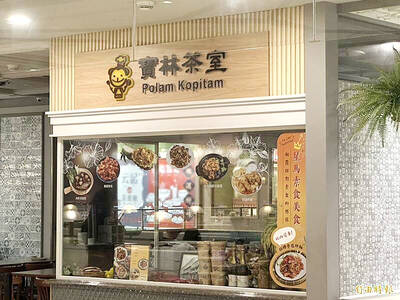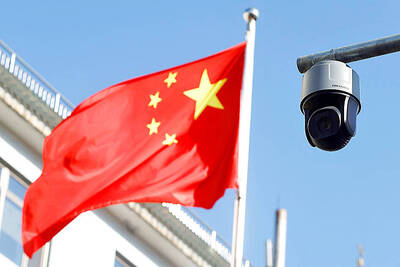Chinese Nationalist Party (KMT) Taipei City Councilor Chung Hsiao-ping (鍾小平) yesterday set off on a one-day “twin-cities” bicycle trip from Taipei to Kaohsiung in a challenge to Taipei Mayor Ko Wen-je’s (柯文哲) re-election bid.
Chung, who has announced interest in joining the KMT primary for Nov. 24’s Taipei mayoral election, began his trip yesterday morning from Guandu Temple (關渡宮) in Taipei’s Beitou District (北投), saying he would take the same route that Ko did in his “twin-tower” bicycle trip on Feb. 28, 2016.
Ko, an independent, completed the 520km ride from Keelung’s Fuguijiao Lighthouse (富貴角燈塔), the nation’s northernmost point, to Oluanpi Lighthouse (鵝鑾鼻燈塔) in Pingtung Country, the southernmost point, in about 28 hours.

Photo: Hsiao Ting-fang, Taipei Times
As Ko finished the 374km “twin-cities” leg in 19 hours and 35 minutes, Chung said he is determined to finish in 18 hours and 30 minutes to symbolize his determination to defeat him.
Standing next to a nearly life-sized cardboard cutout of Ko in front of Guandu Temple yesterday, Chung, in full cycling gear and a helmet, said he chose to begin at the temple, because Ko had passed it during his trip and because it is at the junction of Taipei’s Tamsui River (淡水河) and Keelung River (基隆河).
“‘Water brings fortune,’ so many stock investors come pray for good wealth,” he said. “I did not come to pray for good fortune, but for votes. I want to beat him [Ko] at the end of the year, and return [the KMT] to power in the capital.”

POLAM KOPITIAM CASE: Of the two people still in hospital, one has undergone a liver transplant and is improving, while the other is being evaluated for a liver transplant A fourth person has died from bongkrek acid poisoning linked to the Polam Kopitiam (寶林茶室) restaurant in Taipei’s Far Eastern Sogo Xinyi A13 Department Store, the Ministry of Health and Welfare said yesterday, as two other people remain seriously ill in hospital. The first death was reported on March 24. The man had been 39 years old and had eaten at the restaurant on March 22. As more cases of suspected food poisoning involving people who had eaten at the restaurant were reported by hospitals on March 26, the ministry and the Taipei Department of Health launched an investigation. The Food and

The long-awaited Taichung aquarium is expected to open next year after more than a decade of development. The building in Cingshui District (清水) is to feature a large ocean aquarium on the first floor, coral display area on the second floor, a jellyfish tank and Dajia River (大甲溪) basin display on the third, a river estuary display and restaurant on the fourth, and a cafe and garden on the fifth. As it is near Wuci Fishing Port (梧棲漁港), many are expecting the opening of the aquarium to bring more tourism to the harbor. Speaking at the city council on Monday, Taichung City Councilor

A fourth person has died in a food poisoning outbreak linked to the Xinyi (信義) branch of Malaysian restaurant chain Polam Kopitiam (寶林茶室) in Taipei, Deputy Minister of Health and Welfare Victor Wang (王必勝) said on Monday. It was the second fatality in three days, after another was announced on Saturday. The 40-year-old woman experienced multiple organ failure in the early hours on Monday, and the family decided not to undergo emergency resuscitation, Wang said. She initially showed signs of improvement after seeking medical treatment for nausea, vomiting and diarrhea, but her condition worsened due to an infection, he said. Two others who

Taiwanese should be mindful when visiting China, as Beijing in July is likely to tighten the implementation of policies on national security following the introduction of two regulations, a researcher said on Saturday. China on Friday unveiled the regulations governing the law enforcement and judicial activities of national security agencies. They would help crack down on “illegal” and “criminal” activities that Beijing considers to be endangering national security, according to reports by China’s state media. The definition of what constitutes a national security threat in China is vague, Taiwan Thinktank researcher Wu Se-chih (吳瑟致) said. The two procedural regulations are to provide Chinese